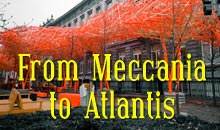These days, one who would write about the unfolding meeting of the West with the Wall of Reality must choose every day whether to write on that day or take some action to protect his family from what he’d be writing about. Financially, escape is no longer possible, for the crumple zone of the careening vehicle has already been smashed. Insane governments have turned a crisis of imprudent banking into a crisis of imprudent sovereign debt. To cure a disease of debt they have issued more debt. To address a fundamental crisis of insolvency, they are pumping the stock Keynesian emetic as though this were a crisis of liquidity. Like Michael Crichton’s environmentalists (1), destroying Nature they arrogantly wanted to manage, pedigreed economists at the helm of the West’s fiscal and monetary destiny have engaged in ignorant, incompetent, and disastrously intrusive intervention that will be followed by attempts to repair the intervention, followed by attempts to repair the damage caused by the repair. Part I of this series posed the linked questions whether Eric Voegelin’s characterization of Gnosticism in his various books on the topic was valid – and whether, as Voegelin asserted, modernity, in the form of the liberal and totalitarian ideologies, could be understood as the resurgence of ancient Gnosticism. The purpose of Part I was not to furnish definitive answers to those questions, but rather to explore two critiques of Gnostic doctrine from Late Antiquity. These were the essay Against the Gnostics by the Third-Century Neo-Platonic philosopher Plotinus and the discussion in Saint Augustine’s Confessions(Books III, IV, and V) of the Manichaean religion, a late variant of Gnosticism. The exposition concluded that the two accounts of Gnosticism although written more than a century apart (Augustine being subsequent to Plotinus) were convergent and largely similar. The prose did not state vigorously that Plotinus and Augustine, in their critiques, anticipate Voegelin, but readers might justly have inferred that as a tacit thesis. Readers might also have registered, as they read the various critical descriptions of Gnostic belief, many parallelisms between ancient cultic doctrine and modern political ideology – particularly the prohibition of questions. I refrained from drawing such parallelisms myself partly so as not to burden the exposition with them but also because I wrote in full confidence that informed readers would find their own way to those same parallelisms. 1. A headline that was not but that could have been “Obama visits: Conditions in the Gulf of Mexico deteriorate.” 2. Ignored interrelationships. (1) There is only one way to reduce the deficit caused government outlays. Would you believe this? It is by cutting spending. (2) There is a reason why item 1 is so hard to digest. Reducing expenditures may be good economics but amount to bad politics. The less deserved an allocation the more vigorous the support it generates.From Meccania To Atlantis - Part 16: Exodus 1: Reality for Radicals

Gnosticism from a Non-Voegelinian Perspective, Part II
Heavenly Order

The UK and Islamist Terror: Conservatives Putting the Nation at Risk?

Monday, 7 June 2010
From the desk of Takuan Seiyo on Sun, 2010-06-06 09:59
» 2039 reads
From the desk of Thomas F. Bertonneau on Sat, 2010-06-05 21:32
» 2 comments | 604 reads
From the desk of George Handlery on Sat, 2010-06-05 11:22
» 1 comment | 794 reads
From the desk of A. Millar on Wed, 2010-06-02 12:57
Posted by
Britannia Radio
at
20:57
![]()





















